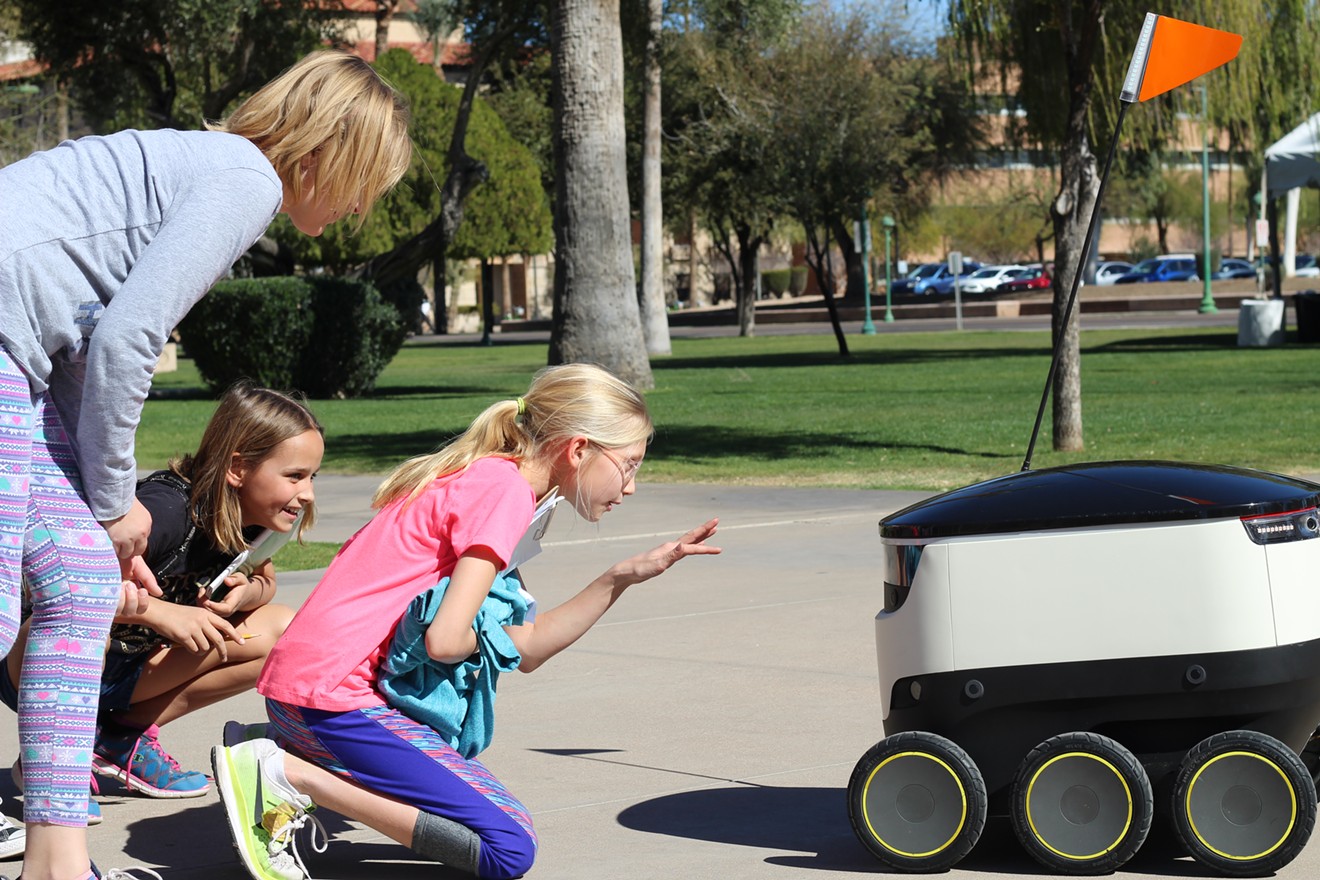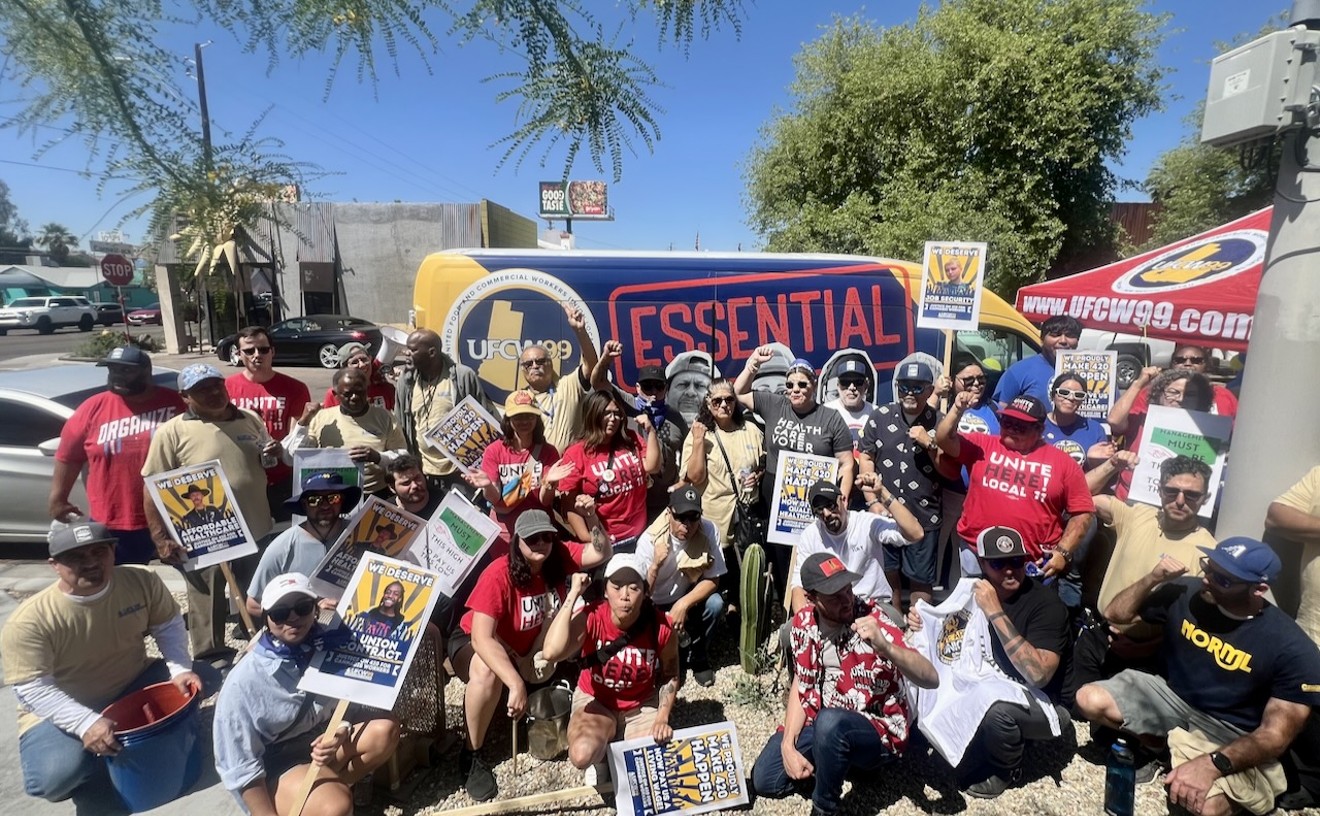This Yeti cooler on six wheels with cameras for eyes is named 6D57, or just "Seven," as robot handler Casper Pineda calls it.
The machine captivated a group of schoolchildren and brought stares from lobbyists and lawmakers as it rolled the sidewalks just east of the Capitol building around lunchtime, guided by Pineda on remote control.
Arizona communities might soon become a testing ground for the devices, which can deliver packages, food, and other items. The state's already known as a haven for semi-autonomous vehicles thanks to an executive order signed by Governor Doug Ducey in 2015.
After the brief show on the Capitol grounds, Pineda and Starship spokesman David Catania took Seven into the House of Representatives building. A security officer opened its top and checked the cargo compartment before waving it through. The trio of two humans and one robot from Starship hung out in the House lounge for a little while, waiting for a hearing before the House Transportation and Infrastructure Committee.
Catania explained that the machine creates a 3-D map that gives it the ability to go nearly full-autonomous once it learns an area. The "personal delivery devices" are already use in five states and Washington, D.C., where Starship and Catania are based.
They're not true robots and aren't fully autonomous. Nor are they unique: Several companies are currently making similar devices, and hotels are experimenting with "butler bots" to deliver things for guests.
Moving at up to 4 mph, the Starship devices would stop and "ping" a human monitor — who could be in D.C. — when faced with an obstacle. The human operator could then detour the machine around the obstacle, or do what's necessary to resolve the problem.
The machines cost less than $10,000 each to make, weigh 50 pounds, and can carry up to 20 pounds of payload. They'll run 2 to 3 hours on a charged battery, typically — it depends if there are any hills or other challenges.
Designed to fill the niche of the "last mile" of delivery without need for a much heavier car or truck, they probably won't take many jobs away from delivery drivers, Catania said.
Delivery drivers don't get good tips on the sort of shorter trips the devices do, so they usually support the idea, he claimed. But if delivery devices "scale up" as an industry and become ubiquitous, Cadania said deliveries could fall to just $1.
And the robots operate on very low energy, equivalent to running a 60-watt light bulb, he said, so they're better for the environment than cars or trucks.
If anyone tries to steal a device, "it has a pretty significant alarm," he said. Plus, an internal GPS system lets the operators know where the devices are at all times.

Schoolchildren touring the State Capitol on Wednesday were captivated by a delivery robot that might soon rove Valley sidewalks.
Ray Stern
The company wants its vehicles to be approved for sidewalks — now, such "personal delivery devices" are technically motor vehicles under Arizona law, and therefore not allowed on sidewalks.
House Bill 2422, introduced by Representative Kelly Townsend, a Republican from Mesa, also adds a section on requirements and prohibitions. The vehicles must stick to sidewalks and crosswalks, obey all traffic signals, drive no faster than 10 mph, always yield the right-of-way to pedestrians, be insured by the company that owns them for at least $100,000 in case they cause damage, and be controlled or at least monitored at all times by the company that owns it.
Townsend pitched the bill at Wednesday's hearing, saying she got the idea for the legislation after seeing the machines at work in Boston last year.
"They may or may not be taking jobs from a delivery guy, but what it is doing is creating high-tech, high-paying jobs," she told the eight-member panel. "I think this is an important step for Arizona to be on the edge of innovation."
The panel voted unanimously to move the bill forward. If the Legislature approves the bill, odds seem good tech-friendly Ducey will sign it into law.
But it's anyone's guess whether the public will appreciate or complain about sharing sidewalks with wheeled delivery devices.
San Francisco passed an ordinance last year to limit the number of delivery machines that are "clogging" city sidewalks.













